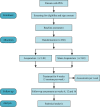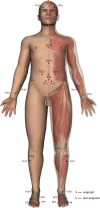Efficacy of acupuncture versus sham acupuncture for postprandial distress syndrome: study protocol for a randomized controlled trial
- PMID: 30658669
- PMCID: PMC6339308
- DOI: 10.1186/s13063-018-3051-3
Efficacy of acupuncture versus sham acupuncture for postprandial distress syndrome: study protocol for a randomized controlled trial
Abstract
Background: Postprandial distress syndrome (PDS) has a considerable impact on quality of life. Our previous pilot trial suggested that acupuncture might be a potential treatment option for PDS. We will conduct this large trial to determine the efficacy of acupuncture versus sham acupuncture for PDS.
Methods/design: A total of 280 eligible patients who meet the Rome IV criteria for PDS will be randomly allocated to either the acupuncture group or the sham acupuncture group. Each patient will receive 12 sessions over four weeks. The primary outcomes will be the response rate of overall treatment effect (OTE) and the elimination rate of all three cardinal symptoms (postprandial fullness, upper abdominal bloating, and early satiation) at four weeks after randomization. Secondary outcomes will include assessments of the severity of dyspepsia symptoms and disease-specific quality of life at weeks 4, 8, and 16 after randomization. All patients who receive randomization will be included in the intent-to-treat analysis.
Discussion: The finding of this trial will provide high-quality evidence on the efficacy of acupuncture for treatment of PDS. Results of this research will be published in peer-reviewed journals.
Trial registration: ISRCTN Registry, ISRCTN12511434 . Registered on 31 March 2017.
Keywords: Acupuncture; Functional dyspepsia; Postprandial distress syndrome; Randomized controlled trial; Sham acupuncture.
Conflict of interest statement
Ethics approval
Research Ethical Committees of Beijing Hospital of Traditional Chinese Medicine Affiliated to Capital Medical University, Dongzhimen Hospital, Beijing Friendship Hospital, Huguosi Hospital of Chinese Medicine and Dongfang Hospital. Written informed consent will be obtained from patients prior to enrolment in the study.
Competing interests
The authors declare that they have no competing interests.
Publisher’s Note
Springer Nature remains neutral with regard to jurisdictional claims in published maps and institutional affiliations.
Figures
Similar articles
-
Acupuncture for postprandial distress syndrome (APDS): study protocol for a randomized controlled trial.Trials. 2017 Nov 13;18(1):537. doi: 10.1186/s13063-017-2285-9. Trials. 2017. PMID: 29132415 Free PMC article. Clinical Trial.
-
Effect of Acupuncture for Postprandial Distress Syndrome: A Randomized Clinical Trial.Ann Intern Med. 2020 Jun 16;172(12):777-785. doi: 10.7326/M19-2880. Epub 2020 May 12. Ann Intern Med. 2020. PMID: 32422066 Clinical Trial.
-
Acupuncture for postprandial distress syndrome: a randomized controlled pilot trial.Acupunct Med. 2020 Oct;38(5):301-309. doi: 10.1177/0964528419900911. Epub 2020 Feb 7. Acupunct Med. 2020. PMID: 32028783 Clinical Trial.
-
Which subtype of functional dyspepsia patients responses better to acupuncture? A retrospective analysis of a randomized controlled trial.Forsch Komplementmed. 2015;22(2):94-100. doi: 10.1159/000380983. Epub 2015 Mar 11. Forsch Komplementmed. 2015. PMID: 26021959 Review.
-
Efficacy of Acupuncture Treatment for Postprandial Distress Syndrome: A Systematic Review and Meta-Analysis.J Immunol Res. 2022 Jun 2;2022:6969960. doi: 10.1155/2022/6969960. eCollection 2022. J Immunol Res. 2022. PMID: 35692506 Free PMC article.
Cited by
-
Electroacupuncture versus sham electroacupuncture in the treatment of postoperative ileus after laparoscopic surgery for colorectal cancer: study protocol for a multicentre, randomised, sham-controlled trial.BMJ Open. 2022 Apr 15;12(4):e050000. doi: 10.1136/bmjopen-2021-050000. BMJ Open. 2022. PMID: 35428615 Free PMC article.
-
Efficacy of acupuncture in refractory irritable bowel syndrome: study protocol for a randomised controlled trial.BMJ Open. 2021 Sep 13;11(9):e045655. doi: 10.1136/bmjopen-2020-045655. BMJ Open. 2021. PMID: 34518248 Free PMC article.
References
-
- Stanghellini V, Chan FK, Hasler WL, Malagelada JR, Suzuki H, Tack J, et al. Gastroduodenal disorders. Gastroenterology. 2016;150:1380–92. - PubMed
Publication types
MeSH terms
Grants and funding
LinkOut - more resources
Full Text Sources
Medical
Miscellaneous




